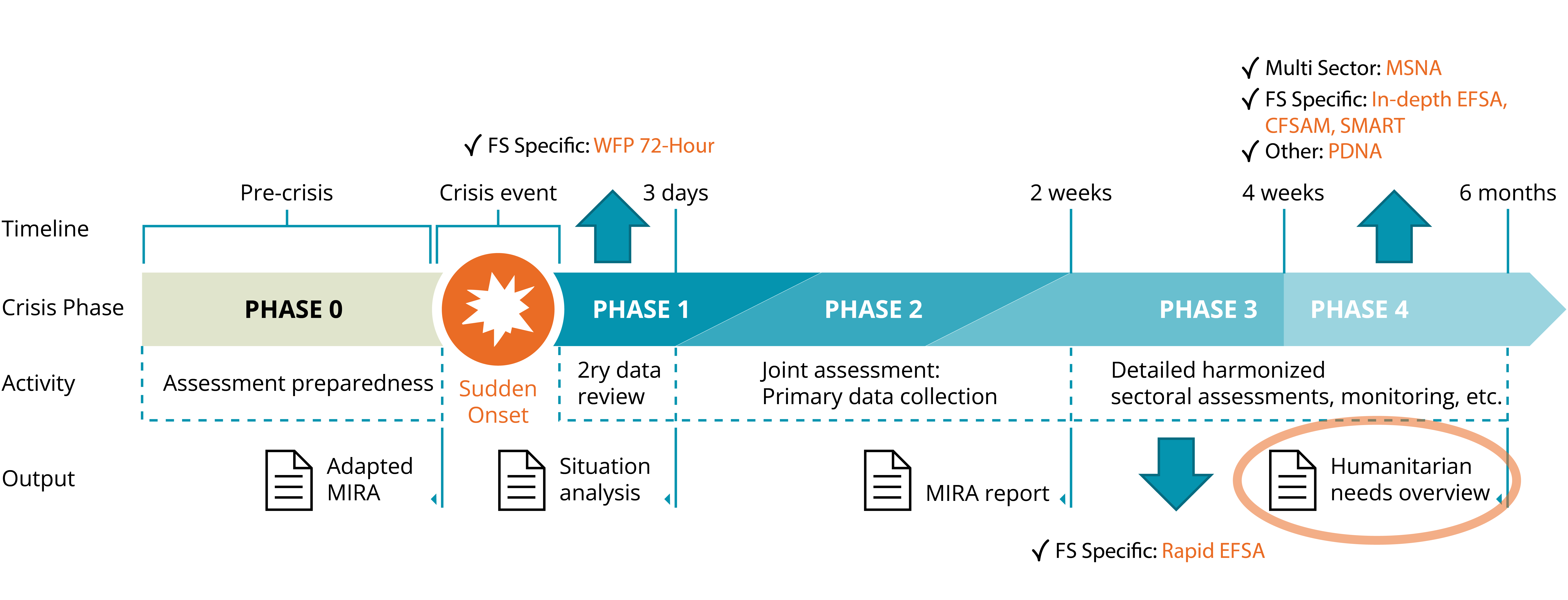In protracted or slow-onset crises, which characterize most humanitarian situations – or at a later stage of a sudden onset crisis (see diagram below), the needs assessments and analysis are anchored within the Humanitarian Needs Overview (HNO).
Overview of the IASC Recommended Phases of Assessments and the HNO

The HNO is a coordinated approach to analyse, outline and prioritize the needs of affected people and is based on cluster (joint or harmonised) and/or multi-sector needs assessments as well as monitoring data, survey results etc. It supports the HCT in developing a shared understanding of the most pressing needs and the impact and evolution of a crisis. This provides the basis for strategic response planning (the HRP) - with the HNO ensuring that credible evidence and a joint analysis of needs underpins an effective and targeted humanitarian response. The HNO includes several components, which the FSC and the FSC Coordinator actively contributes to. See 9.4.1 for details (including guidance on and narrative pointers for the FSC specific HNO chapter and FSC (sector) PIN calculation).
What is the role of the FSC Coordinator: The needs assessments and analysis described in this chapter support the development of the HNO and provides the foundation for the Coordinator (with partners) to prepare the FSC specific chapter with analysis of the food security situation and the calculation of the PIN.
How this information is utilised is critical for the cluster’s work. The Coordinator plays a key role in translating available assessment / analysis data into a coherent representation of the food security situation and needs (through the HNO) and in making sure the outcomes are used to inform the FSC response (i.e. response analysis and HRP, see 9.5). Where available, the IPC (or CH), which reflects a technical consensus across different food security sector datasets, should form a basis for the FSC’s HNO focus.
Usually, the Coordinator (with IMO support) will work with technical colleagues (partners, RAM unit etc) to ensure the correct data is reflected. Depending on the FSC setup in country, the Coordinator will commonly prepare the HNO draft narrative. Once reviewed by CLAs, this is shared either with all FSC partners for review and endorsement or with the SAG or a TWG.
Overall, the Coordinator should ensure:
- To take active part in the full HNO process.
- A consultative process: partners are kept updated and involved in the HNO process. The FSC SAG, where available, can also be used as a “working group” throughout the HNO (and HRP).
- To update the CLAs on progress, and any issues of concern (which may be addressed in HCT where CLAs represent the FSC).
- See 9.4.1 for full details on the Coordinator role and FSC specific guidance.
Support: Contact the GST for guidance and support (gFSC Help Desk). The GST provide yearly webinars to support Coordinators with the HNO/HRP process at country level – see the Humanitarian Programme Cycle Guidance webpage for all relevant resources.
Resources: See resources in 9.4.1. Official guidance on HNOs and the HPC are subject to yearly change and Coordinators should check for relevant updates. These should be available on the OCHA webpage.